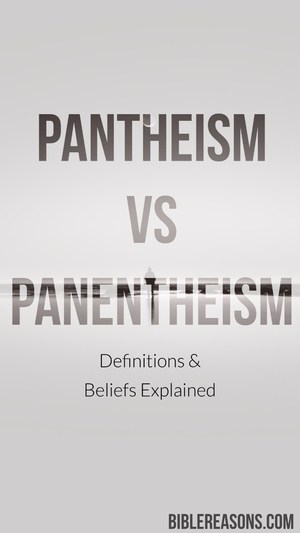
Two philosophical ideas that are easily confused is pantheism vs panentheism. Let’s try to dig into this a bit to see what all the differences are and what Scripture has to say about them.
What is pantheism?
Pantheism is a philosophical belief that God can be equated with the universe and what is in it. It is not the same thing as Panentheism, but it is very similar. In Pantheism the universe itself is divine. This is in contrast to Theism, which holds that the entire universe is outside of God. Pantheists are often determinists in their understanding of what occurs.
Pantheism supports the belief that God determines everything. The Greek Stoics held this philosophical view. They claim that this is the only way that God can know everything – if He is everything. Pantheist see God in the beauty of the flower and the flower as a part of God. This is contrary to Scripture.
Problems with pantheism: Scriptural evaluation
The Bible teaches that God the Father is a spirit and is not a physical being. The Bible also teaches that God created all things. Pantheism is not logical because it does not allow for a creator. Christianity rightly separates God the Father as Creator apart from His creation and created beings.
Psalm 19:1 “The heavens declare the glory of God, and the sky above proclaims His handiwork.”
John 4:24 “God is spirit, and those who worship him must worship in spirit and truth.”
John 1:3 “All things were made through him, and without him was not anything made that was made. “
What is panentheism?
Panentheism Is also known as Monistic Monotheism. This is the philosophical belief that all things are God: the God interpenetrates all things and all aspects of all things, and that He transcends it. It claims that God is everything in the world and yet greater than the world. The whole of nature is deity, and yet the deity is transcendent. Panentheism objects to theological determinism and holds to a plurality of active agents within the realm of the supreme agent. Panentheism is not determinism, like Pantheism often is. Logically this doesn’t make sense. If deity is everything known and unknown, what is there to transcend from and to?
Problems with panentheism: Scriptural evaluation
Panentheism is not scriptural. Panentheism says that god is like a man, which is heretical. God does not learn, because He already knows all things. God is perfect, eternal and is not limited by His creation.
1 Chronicles 29:11 “Yours, O Lord, is the greatness and the power and the glory and the victory and the majesty, for all that is in the heavens and in the earth is yours. Yours is the kingdom, O Lord, and you are exalted as head above all.”
Psalm 139:7-8 “Where shall I go from your Spirit? Or where shall I flee from your presence? If I ascend to heaven, you are there! If I make my bed in Sheol, you are there!”
Psalm 147:4-5 “He counts the number of the stars; He calls them all by name. 5 Great is our Lord, and mighty in power; His understanding is infinite.”
Conclusion
We can be sure that the God of the Bible is the one and true God. Pantheism and Panentheism don’t work when looked through a logical lens. Nor do they affirm what the Bible says – what God says about Himself.
Romans 1:25 “They exchanged the truth about God for a lie, and worshipped and served created things rather than the Creator – who is forever praised. Amen.”
Isaiah 45:5 “I am the Lord and there is no other; apart from me there is no God. I will strengthen you, though you have not acknowledged me.”
